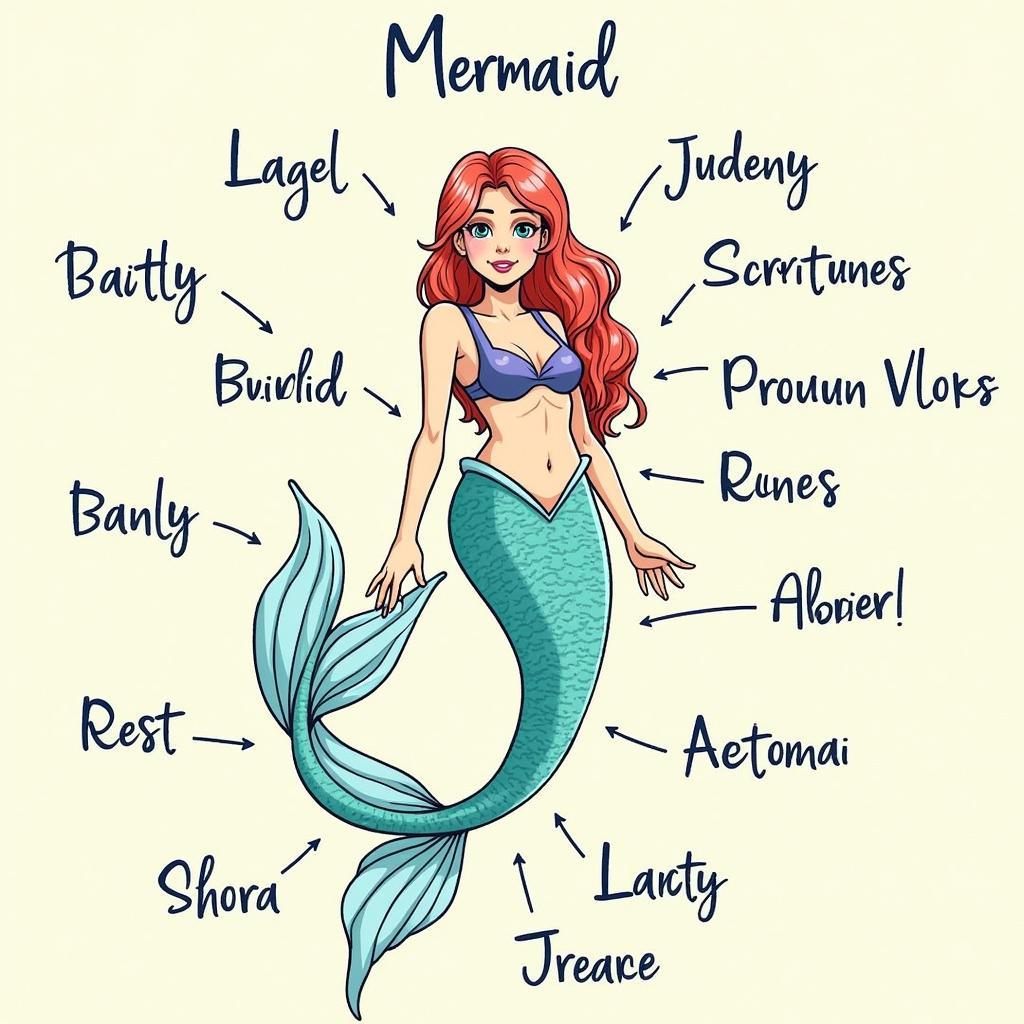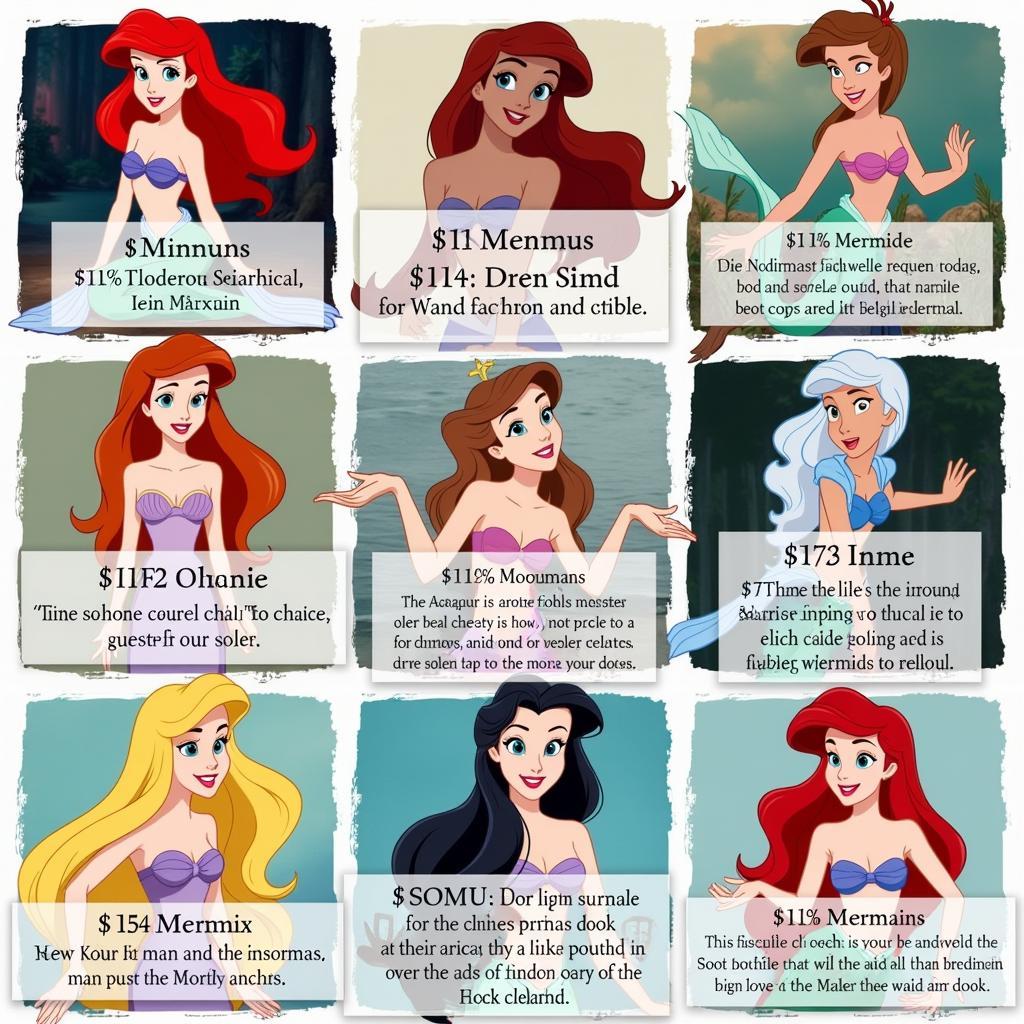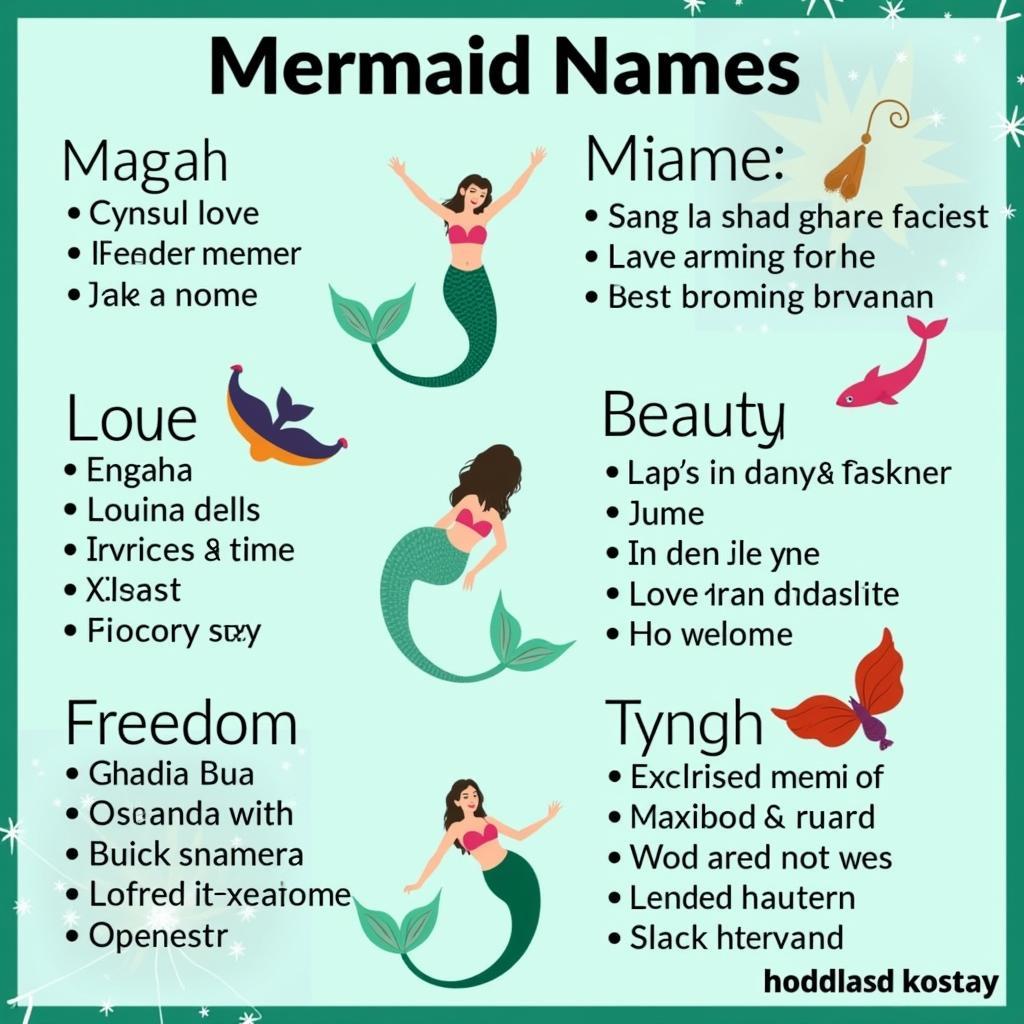Mermaid Names in Mythology: A Deep Dive into Oceanic Legends
October 25, 2024Myths and legends about mermaids have captivated hearts and minds for centuries. These enchanting creatures, often depicted as beautiful women with fishtails, have inspired countless stories, poems, and songs. While the existence of mermaids remains a mystery, their captivating presence in mythology continues to intrigue us. One aspect that adds to their allure is their names, which often reflect their mystical nature and watery domain. This article delves into the fascinating world of Mermaid Names In Mythology, exploring their origins, meanings, and cultural significance.
 Mermaid names in different cultures
Mermaid names in different cultures
Unveiling the Magic: Origins of Mermaid Names
Mermaid names are as diverse as the cultures that imagined them. In many traditions, their names echo the sounds of the ocean, mimicking the crashing waves or the gentle lapping of water against the shore. For instance, the name “Calypso,” derived from the Greek word “kalyptein” meaning “to conceal,” hints at the mysterious and alluring nature often attributed to mermaids.
 Famous mermaid names in literature and film
Famous mermaid names in literature and film
Other cultures drew inspiration from marine life when naming their mermaids. The name “Coralia” has Latin roots, stemming from the word “corallium” meaning “coral,” signifying a connection to the vibrant underwater world these creatures inhabit. These naming conventions reflect the deep respect and awe our ancestors held for the ocean and its inhabitants.
Beyond the Surface: Meanings and Symbolism
Mermaid names often carry profound meanings, offering glimpses into the characteristics and roles these creatures played in different cultures. Some names, like “Amphitrite,” the wife of Poseidon in Greek mythology, denote power and authority over the seas. Her name, meaning “the third element” or “the sea surrounding all,” highlights her significance as a powerful sea goddess.
 Symbolic meanings of mermaid names
Symbolic meanings of mermaid names
Conversely, names like “Melusine,” a popular figure in European folklore, represent the duality of mermaids. Often depicted as a woman with two fishtails, Melusine embodies both beauty and danger, capable of great love and fierce vengeance. Her name, thought to be of Celtic origin, meaning “marvel” or “wonder,” underscores the captivating yet unpredictable nature of these mythical beings.
More Than Just a Name: Cultural Significance
Mermaid names transcend mere labels, serving as powerful symbols embedded in cultural beliefs and traditions. In some cultures, mermaids were revered as protective deities, their names invoked during sea voyages or fishing expeditions. For instance, in Scottish folklore, the “Ceasg,” whose name means “maiden of the waves,” was believed to grant good fortune to fishermen who treated her with respect.
In other traditions, mermaid names became cautionary tales, warnings against the dangers lurking beneath the waves. The “Sirens” of Greek mythology, known for their enchanting voices that lured sailors to their deaths, serve as a prime example. Their name, derived from the Greek word “seira” meaning “rope” or “cord,” alludes to the invisible threads of temptation and peril they represented.
FAQs: Delving Deeper into Mermaid Names
1. What are some popular mermaid names for babies?
Drawing inspiration from mythology and folklore, popular mermaid-inspired baby names include:
- Girls: Coralia, Ariel, Ondine, Calypso, Stella Maris (Latin for “star of the sea”)
- Boys: Triton, Caspian, Oceanus, Dylan (Welsh for “son of the sea”)
2. Are there any male mermaid names?
While female mermaids dominate mythology, male counterparts do exist. They are often referred to as “mermen” and have equally captivating names like Triton (Greek mythology), Merrow (Irish folklore), and Vodyanoy (Slavic mythology).
3. What cultural variations exist in mermaid mythology?
Mermaid lore varies widely across cultures. For example, Japanese mythology features “Ningyo,” often depicted as fish with human heads, while West African folklore speaks of “Mami Wata,” a powerful water spirit associated with healing and fertility.
Explore Further:
For those eager to dive deeper into the world of mermaid names and mythology, our website offers a treasure trove of information:
- Article: “Mermaid Legends Around the World”
- Article: “The Language of the Sea: Decoding Mermaid Communication”
- Quiz: “Which Mythical Mermaid Are You?”
Need help choosing the perfect mermaid name for your story, artwork, or little one? Contact us!
Phone: 0915117113
Email: [email protected]
Address: Tổ 3 Kp Bình An, Phú Thương, Việt Nam, Bình Phước 830000, Việt Nam.
Our team is available 24/7 to assist you on your mermaid-inspired journey!